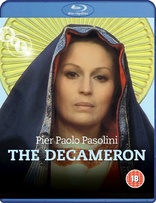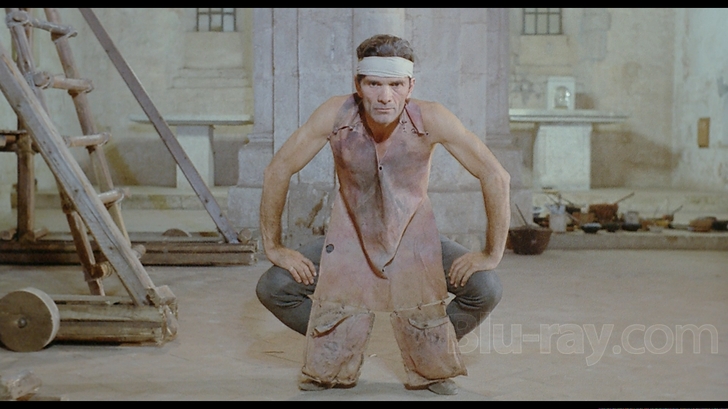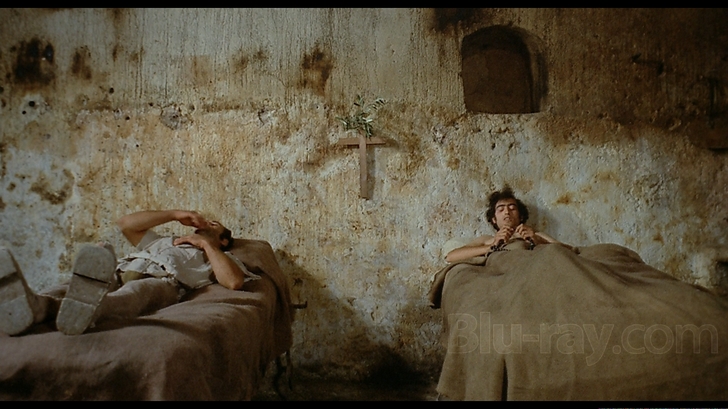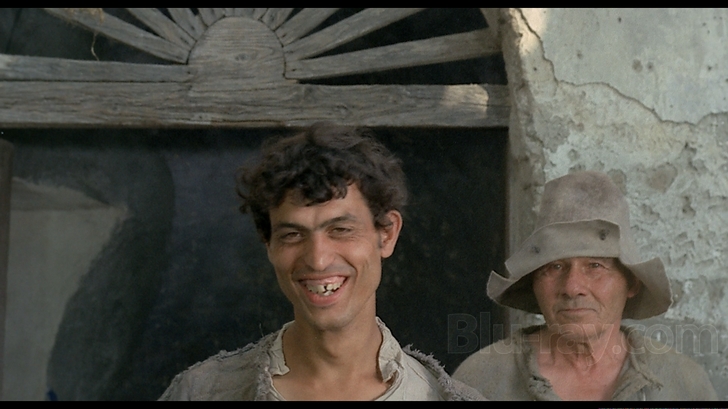The Decameron Blu-ray Movie
HomeThe Decameron Blu-ray Movie 
Il DecameronBFI Video | 1971 | 111 min | Rated BBFC: 18 | Apr 27, 2009

Movie rating
6.9 | / 10 |
Blu-ray rating
| Users | 0.0 | |
| Reviewer | 3.5 | |
| Overall | 3.5 |
Overview
The Decameron (1971)
An adaptation of nine of the 100 stories from Giovanni Boccaccio.
Starring: Franco Citti, Ninetto Davoli, Jovan Jovanovic, Angela Luce, Pier Paolo PasoliniDirector: Pier Paolo Pasolini
| Foreign | Uncertain |
| Drama | Uncertain |
| Romance | Uncertain |
| Erotic | Uncertain |
| History | Uncertain |
| Comedy | Uncertain |
Specifications
Video
Video codec: MPEG-4 AVC
Video resolution: 1080p
Aspect ratio: 1.85:1
Original aspect ratio: 1.85:1
Audio
Italian: LPCM 2.0 Mono (48kHz, 24-bit)
English: LPCM 2.0 Mono (48kHz, 24-bit)
Subtitles
English, English SDH
Discs
50GB Blu-ray Disc
Single disc (1 BD)
Playback
Region B (locked)
Review
Rating summary
| Movie | 4.0 | |
| Video | 3.5 | |
| Audio | 4.0 | |
| Extras | 4.0 | |
| Overall | 3.5 |
The Decameron Blu-ray Movie Review
Reviewed by Dr. Svet Atanasov April 22, 2009BFI (British Film Institute) introduce the first installment in Pier Paolo Pasolini's Trilogy of Life, "The Decameron" (1971). The film has been newly transferred in High-Definition using the original 35mm negative film elements. "Notes for an African Oresteia" (1970), the Italian director's semi documentary film, fully restored by Cineteca di Bologna, is included on the Blu-ray disc as well. Region-B "locked.

Pier Paolo Pasolini as Giotto
A bold and at times surprisingly explicit satire targeting religion and class, controversial Italian director Pier Paolo Pasolini’s The Decameron is the first installment in his notorious Trilogy of Life. The film is loosely based on Giovanni Boccaccio’s fourteen-century collection of erotic stories Il Decameron.
The ten stories of The Decameron are divided into two parts. In the first part we learn about the murderer Ciappelletto (Franco Citti) who becomes a saint, the naive foreigner Andreuccio (Ninetto Davoli) who gets robbed by two local scoundrels, and a group of nuns who take advantage of a young man who poses as a deaf-mute so he could become a gardener. These stories are loosely joined by the sporadic appearance of Ciappelletto.
In the second part all of the stories are united by the presence of the artist Giotto – played by Pasolini himself – who has come to Naples to paint a fresco for one of the city’s cathedrals. We learn about the very young Catherina and her lover who are caught naked and asked to marry, the young Elizabetta and her servant and lover Lorenzo who gets killed by her angry brothers, the opportunistic Don Gianni, and the peasant Meuccio, whose deceased friend Tingoccio appears to tell him that in the afterlife sex isn’t considered a sin.
Despite the fact that each of the three films in Pasolini’s Trilogy of Life – The Decameron, Canterbury Tales, and Arabian Nights – contains plenty of scenes where naked bodies are seen, none of them is particularly arousing. They are scandalous and provocative not because of the occasional decadence their stories convey, but rather because they manipulate the past (in The Decameron, a flawed notion of the Middle Ages) in order to critique the present.
It should not be surprising then that each of the main characters in The Decameron is extremely difficult to like. The good ones for example are impossible to embrace; they are meek, defeated and constantly ridiculed. Unsurprisingly, many critics have speculated that these characters were representative of Pasolini’s frustration with the masses and their lack of desire to challenge the then-current socio-political status quo.
The bad ones are simply hideous. Interestingly enough, in practically every episode from The Decameron their crimes and sins are forgiven. Again, this isn’t accidental; it is directly related to Pasolini’s detestation of the Catholic Church and the values and beliefs it promoted at the time (nine years before The Decameron was completed Pasolini was actually arrested on charges that he had insulted the Catholic Church in his poetry and films).
Giotto, the famous artist Pasolini himself played, is a symbolic figure as well. He may seem a bit out of place - he is a transitional figure, not a central one - but his presence in The Decameron is of utmost importance. Giotto embodies Pasolini’s conviction that a true artist is uncommitted to religion and politics.
The Decameron Blu-ray Movie, Video Quality 

Presented in its original aspect ratio of 1.85:1, encoded with MPEG-AVC and granted a 1080p transfer, Pier Paolo Pasolini's The Decameron arrives on Blu-ray courtesy of UK-based distributors BFI (British Film Institute).
The Decameron has been newly transferred in High-Definition using the original 35mm negative film elements and, as expected, the results are quite good. Obviously, this 1080p transfer is a substantial upgrade over the previously available SDVD version of the film, which has been in circulation for quite some time (circa 2001). What immediately makes an impression here is the improved color-scheme: blacks are notably richer and more stable, browns and blues more natural looking, and greens and yellows not as inconsistent (and bleeding) as they were on the SDVD UK version of the film. Contrast, clarity and detail are also notably improved; close-ups in particular look surprisingly strong. Some of the panoramic scenes tend to be a bit unstable – I noticed a few contrast fluctuations as well as a bit of macro-blocking here and there – but, overall, a lot of these limitations are undoubtedly ingrained in the actual film negative, so without a complete restoration, this is certainly the best Pasolini's film could look. On a similar note, I detected a few minor specks and scratches but, again, the overall quality of the transfer is more than satisfying, and I don't have a problem recommending BFI's Blu-ray release. (Note: This is a Region-B "locked" release which you won't be able to play on your Region-A PS3 or SA. In order to access the content of this disc, you have to have a native Region-B or Region-Free player).
The Decameron Blu-ray Movie, Audio Quality 

There are two audio tracks on this Blu-ray disc: the original Italian LPCM 2.0 track and an English LPCM 2.0 dub (available as an extra). Generally speaking, there are no serious issues that I could detect with either of the two tracks. The dialog is clear and easy to follow (of course, you have to keep in mind that The Decameron was overdubbed – a typical for Italian cinema at the time practice - after it was completed) and legendary composer Ennio Morricone's soundtrack adds to the viewing experience rather well. This being said, there are a few minor balance issues that I was able to detect – certainly not serious dropouts, hissings, or pops – but, again, I believe that these were simply replicated from the original source. This being said, optional white English subtitles are provided for the main feature. As far as the English dub is concerned, all that I could say is that I would not recommend that you watch the film with it – it is quite bland and ineffective (and, indeed, this is the old American track that was used by United Artists).
The Decameron Blu-ray Movie, Special Features and Extras 

The Decameron arrives with a lovely 18-page booklet containing a number of informative essays - "The Trilogy of Life" by Sam Rohdie (a scholar and author of The Passion of Pier Paolo Pasolini), "The Decameron" by Roger Clarke (an author and critic), "The Decameron reviewed" by Nigel Andrews (originally published in Monthly Film Bulletin in March, 1972), and "Pier Paolo Pasolini (1922-1975)" by Geoffrey Nowell-Smith (originally published in the Oxford History of World Cinema).
As noted earlier, the English version of The Decameron is available as a supplemental feature. In addition to the original theatrical trailer (1080i), BFI have also supplied Pasolini's black and white semi documentary film Notes for an African Oresteia (1970). Narrated by Pasolini himself, the film offers a curious look at the director's obsession with Greek mythology where he promotes some of his more radical socialistic ideas. This is the newly restored by Cineteca di Bologna print of the film (according to filmarchives-online.eu). Presented in its original aspect ratio of 1.37:1 with imposed English subtitles (1080i).
The Decameron Blu-ray Movie, Overall Score and Recommendation 

Those of you interested in the work of controversial Italian director Pier Paolo Pasolini should definitely look into his fascinating Trilogy of Life. The Decameron, the first installment in it, has received a solid treatment by the British Film Institute. Unfortunately for those of you residing in Region-A territories, this is a Region-B "locked" release, which means that unless you have a native Region-B or Region-Free player, you won't be able to take advantage of it. Recommended.
Similar titles
Similar titles you might also like

The Canterbury Tales
I racconti di Canterbury
1972

Arabian Nights
Il fiore delle mille e una notte
1974

Malena
2000

Sebastiane
1976

Identification of a Woman
Identificazione di una donna
1982

The White Sheik
Lo sceicco bianco / Vintage World Cinema
1952

Portrait of a Lady on Fire
Portrait de la jeune fille en feu
2019

Deep End
BFI Flipside
1970

Yesterday, Today and Tomorrow
Ieri, oggi, domani
1963

The Tree of Wooden Clogs
L'albero degli zoccoli / Arrow Academy
1978

L' Eclisse
1962

Certified Copy
Copie conforme
2010

Salò, or the 120 Days of Sodom
Salò o le 120 giornate di Sodoma
1975

Marriage Italian Style
Matrimonio all'italiana
1964

A Lesson in Love
En lektion i kärlek
1954

La Règle du Jeu
The Rules of the Game
1939

Together
Tillsammans
2000

Senso
The Wanton Countess | Limited Edition
1954

Le Amiche
The Girlfriends / Masters of Cinema
1955

Immoral Tales
Contes immoraux / Arrow Academy
1974
